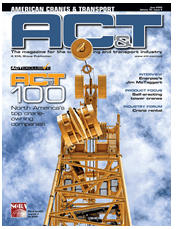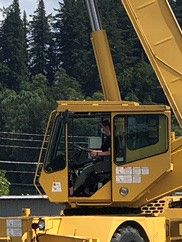Earlier this month, we had the opportunity to speak with American Cranes & Transport about how ITI quickly shifted our course offerings to allow students to continue learning in the midst of the COVID-19 pandemic. While we've had our four Online Course Libraries - Crane & Rigging, Rigging Engineering, Plant Maintenance, and Safety - for some time now, we realized that we needed to address how we were going to conduct live training. In March, in an effort to support social distancing, we pivoted from Instructor Led Training programs which have traditionally taken place in a classroom setting, to providing webinar offerings to those in need of remote learning options.
ITI President & CEO, Zack Parnell discusses hybrid learning models, resuming our in-person training, and the recent uptick we've seen in OperatorPro usage. You can read the full article from their June issue below.
Posted with permission of American Cranes & Transport. View the full issue here.
The Virtual Classroom
Due to the Covid-19 virus, remote training has become a necessity.
The Covid-19 crisis has seriously impacted crane and rigging training. Classroom training is slowly returning with a variety of social distancing measures put into place. “Instructor-led training came to a halt for about six weeks starting in mid-March,” said Zack Parnell, president and CEO of Industrial Training International (ITI). “Thankfully, we were able to begin delivering training services by early May.” ITI has been offering online learning for over 10 years and has seen an increase in subscriber usage, including crane and rigging companies. “We had dabbled in live online training in the past,” he said. “With that experience, we were able to reignite that solution again in late March – we’ve also held about 20 live online training courses since the lockdowns began.”
Jim Headley, CEO and president of Crane Institute of America (CIA), said CIA has done well through the crisis due to its variety of products, books and other training materials that it sells. “We are just getting ready to roll out digital crane inspection checklists, and we have been doing a lot of online training, so we didn’t really miss a beat,” he said. “Our philosophy has always been student-centered education which makes our training easily adapted to online or virtual training. There is an emphasis on creative training techniques and participation by the student, not traditional lectures. To learn, you have to work, so there is a lot of effort put forth by the student. With all good student materials we have, (text books and workbooks) it’s been easier for us.”
Some training companies will not survive this crisis. Future training will likely be a combination of online platforms and classroom instruction. Headley said the pandemic may lure more young people to the crane industry than in the past, especially since a college education is so expensive and the job market may take years to recover.
OSHA “upped the ante,” Headley said, with the crane operator certification law. The law includes specific training topics that must be covered and that require a more training time. “Certification is now a three-step process for crane operators to be considered qualified and involves training, certification and evaluation,” he said. Training is more important than ever. And in the future, Headley said training programs may have to be accredited. “Like certification programs, training programs will have to follow a similar process for accreditation,” he said. “It’s already being done in some areas of the country.”
Extensions given
The National Commission for the Certification of Crane Operators (NCCCO) has seen a decline in certification testing that has led to modified testing protocols, extended expiration dates and testing deadlines. NCCCO is working with test site coordinators to schedule and hold traditional paper/pencil test administrations at locations that meet necessary safety precautions.
Last month, NCCCO’s computer-based testing partner PSI opened 75 percent of its owned and operated sites. Third-party sites will continue to become available. All sites continue to operate at less than 100 percent capacity to ensure social distancing requirements are met. Parnell said ITI is seeing its instructor-led training calendar fill up again and still expects to deliver hands-on training in the future. In the month of May, ITI delivered courses in Washington, California, Texas, Alabama and Florida. “We are seeing significant increases in demand for online learning courses, learning management solutions and virtual reality simulation,” he said. “We are investing a great deal with our customers in additional training and testing content so that hybrid learning options are available like online NCCCO test prep, additional VR crane models in simulation and non-operator VR modules for technicians, spotters, riggers and more. The objective of which is to bring improved solutions to the branch level, for local administrators and trainers to utilize.”
Parnell said ITI has seen an uptick in OperatorPro usage, which allows crane and equipment operators to record their shifts, activities like lifts and even employer evaluations. “We expect quite a bit of workforce shifting to occur in the next 12 months – people who can track and communicate their work experience, training, qualifications and certifications efficiently and clearly to new employers will have an advantage,” he said.
Altered delivery
Manufacturers have also altered their training program delivery. Tadano Demag began offering free online training between April 28 and May 6, when classes were fully booked. A series of 10 courses covered the Lift Plan and IC-1 Remote systems. Lift Plan is a free online job planning tool and IC-1 Remote is a telematics and crane control system. WIKA Mobile Control has also begun offering virtual service training courses including online classroom instruction and interaction, as well as live simulator training. Classes are available through early July.



COMMENTS